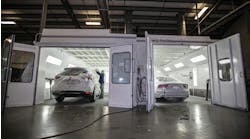As I write this, I’m just as unsure as all of you about where things will stand 60 days from now. Like you, I’m facing the tough day-to-day questions related to the new world we find ourselves in, trying to determine how to respond in a way that is best for my household, my business, my community and my industry.
So I think my message to you here is that as you wrestle with those day-to-day challenges, don’t forget to invest some time on the bigger-picture questions. Questions like: What can I learn from this? How can I better prepare for the next time?
Because while the COVID-19 pandemic – and the effort to respond to it – are in many ways unlike anything we’ve seen in our lifetime, major disruptions are part of the business cycle. Those of you who owned and operated businesses on Sept. 11, 2001, or during the 2007 and 2008 financial crisis, know what I’m talking about. If your market has endured a major hurricane, widespread flooding, an earthquake or a three-week monster snowstorm, you’ve seen business disruption.
So what can you learn from our current situation to help you better prepare for the next time? Here’s who I think best set themselves up to make it through this.
Those that remain connected to their community. Whether you’re in a rural town or a neighborhood in a big city, developing and maintaining ties to your local community will serve you well. People know you; they know who you are. They’ve met you through the Rotary or the Lion’s Club, or you coach their kid’s Little League team. There’s a human relationship there. They will remember that and will want to support your business as they can. That’s something you can do that a large chain often cannot.
Those that gave their employees more than a paycheck. You’re seeing right now the importance of managing debt and maintaining some savings. But have you helped your employees learn to do the same? Employees living paycheck-to-paycheck may need to move elsewhere or change careers if they’re not able to weather through just as your business is trying to do. Had you offered them a retirement plan? Had you offered them the health insurance they need? Had you brought in some training on personal financial management? I know a shop that implemented an incentive plan for employees working to save for a major purchase or medical emergency. Helping employees prepare has to be part of your business preparedness.
Those who worked to have credit lines in place. A relative of mine operates a business in one of the industries most immediately hard-hit by COVID-19. He initially thought his strong cash position would help him through. When he realized it wouldn’t, it was too late to refinance or expand his credit lines: He wasn’t going to qualify at that point, no matter how much cash he had in the bank, because his short-term revenue forecast was non-existent. So prepare for the next time not only by having some savings, but also by always keeping your credit lines in shape. That can help you, for example, take care of your furloughed employees, so they’re still there when the workload returns, rather than finding yourself starting at ground zero.
Those who diversified. What if that new-car dealer who refers you lots of work doesn’t make it through this? What if a merger eliminates a vehicle brand or even an insurance company, and that direct repair program or shop certification that had become the majority of your business goes away? Can you do almost every aspect of repairs in-house – or are you subletting too much work (along with revenue and profit) to others (who themselves may or may not make it through this)? The old adage of avoiding having too many of your eggs in any one basket is a key lesson some businesses may now be learning the hard way.
I know it’s hard to think about some of this big-picture stuff when you’ve got major day-to-day challenges. But those who have done so previously are the most likely to make it through this major disruption – and it’s never too early to start preparing for the next one.




